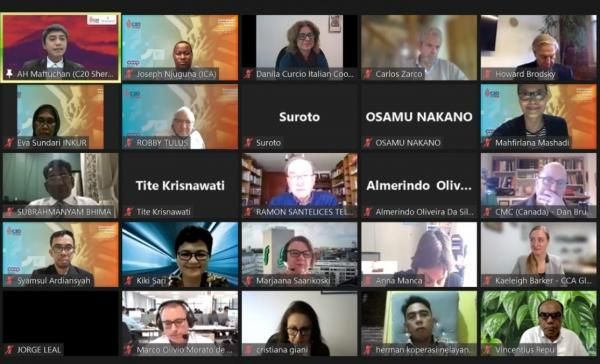
As Indonesia is hosting the presidency of the G20 this year, INKUR Federation, a member of the International Cooperative Alliance, is leading the effort to have cooperative voices and priorities heard in the B20 and C20 task forces. Cooperatives have much to offer in terms of the economy, society, and the environment and need to actively engage in the G20 advocacy processes to contribute to the success of the G20 priorities in building a better world and a more sustainable future for all and have their views incorporated in the policy recommendations.
The C20 is an official engagement group which brings together civil society organisations so they can present ideas to the G20 agenda. The Civil 20 process involves a wide variety of organisations and networks far beyond the G20 countries and it is structured around the C20 Guiding Principles and organised in thematic Working Groups. This year under Indonesia’s presidency, C20 is committed to advocate evidence-based policy recommendations. The output of C20 advocacy works is C20 Policy Pack and C20 Communiqué containing the policy recommendations, which will be launched at C20 Summit in October 2022.
Last month, ICA in collaboration with INKUR hosted an online event for cooperatives, where Howard Brodsky, Founder and CEO of CCA Global Partners and Chair of the ICA G20 Working Group, talked about the challenges facing the global community during times of crisis.
“It is really critical and important that cooperatives around the world have a seat at the table,” he said, “and that they are part of the policy decisions to understand the crucial values that cooperatives can bring to having a more inclusive economy.”
Ah Maftuchan, Sherpa of the Indonesian C20, said the C20 Group has already started consultations with stakeholders and key actors to make sure that civil voices, including cooperatives, are heard and recognised.
“We will all advocate the contribution of the cooperative movement to sustainability, not only in the economic sector, but also in the social and environmental sector,” he said.
Danila Curcio described the cooperative movement’s C20 engagement under the Italian G20 presidency in 2021, when the Italian Cooperative Alliance participated in eight C20 working groups with more than 20 representatives. The Italian cooperative movement also fostered political relations with the Italian government and the C20 Chair and Sherpas by organising a webinar with the C20 Sherpa and a side-event during the C20 Summit.
“We learnt by doing,” she said. “We managed to have cooperatives mentioned in four sectors.
“Our hope is that what we started and what you are doing in Indonesia shall not be lost for the future when you pass the baton to the Indian cooperative movement.”
The webinar also highlighted cooperatives’ contribution to sustainable development.
Indonesian cooperator Robby Tulus said: “Cooperatives all over the world implement many activities, and use tangible and physical outputs that contribute to the Social Development Goals.” There is still a need to present clear evidence of outcomes, he added, to demonstrate the link with the UN's Sustainable Development Goals (SDGs).
Bhima Subrahmanyam, President of the International Cooperative Banking Association (ICBA), revealed the findings of a recent study of how cooperative banks contribute to SDGs. Due to be unveiled soon, the report looks at the enablers and drivers of sustainable development, with case studies of cooperative banks taking the lead on sustainability.
Carlos Zarco, President of the International Health Cooperative Organisation (IHCO), said health cooperatives had helped to meet the surge in the demand for health services during the pandemic whilst guaranteeing the safety of health professionals.
“The cooperative model evolves and adapts easily to the socio-economic context and local conditions of the health sectors, which allows it to provide more flexible responses to the needs of its members and the community,” he said.
Osamu Nakano, Director of International Relations at the Japan Workers’ Cooperative Union, talked about the role of worker and social cooperatives in providing employment opportunities to vulnerable groups. Adopted in 2020, Japan’s Worker Cooperative Act highlights the role of cooperatives in the implementation of the SDGs.
Mr Nakano was involved in Japan’s C20 Group in 2019, whose recommendations included support for new forms of digital ownership such as platform cooperatives and promoting financial cooperatives as part of a more diverse banking system. The group also highlighted the role of cooperatives in providing youth employment.
Eva Sundari, from INKUR, said cooperatives empower women by promoting economic democracy and are the answer to economic and gender disparities.
In his concluding remarks, Balu Iyer, regional director, ICA-AP, said the speakers had shared the role cooperatives play in delivering better outcomes. This includes equitable access to goods and services, and the provision of healthcare, social and insurance services to vulnerable categories of people, he added.
Cooperatives also offer access to finance for their members and communities, and promote community development to create better livelihoods and decent work. They are also delivering sustainable energy sources, mitigating climate change, and advancing gender equality and equitable treatment for marginalised communities and people.
“All this while relating to the 17 Sustainable Development Goals,” added Mr Iyer, telling the webinar he hoped cooperatives could work with other partners to secure recognition for the movement in the G20 recommendations.
Watch the webinar here.




